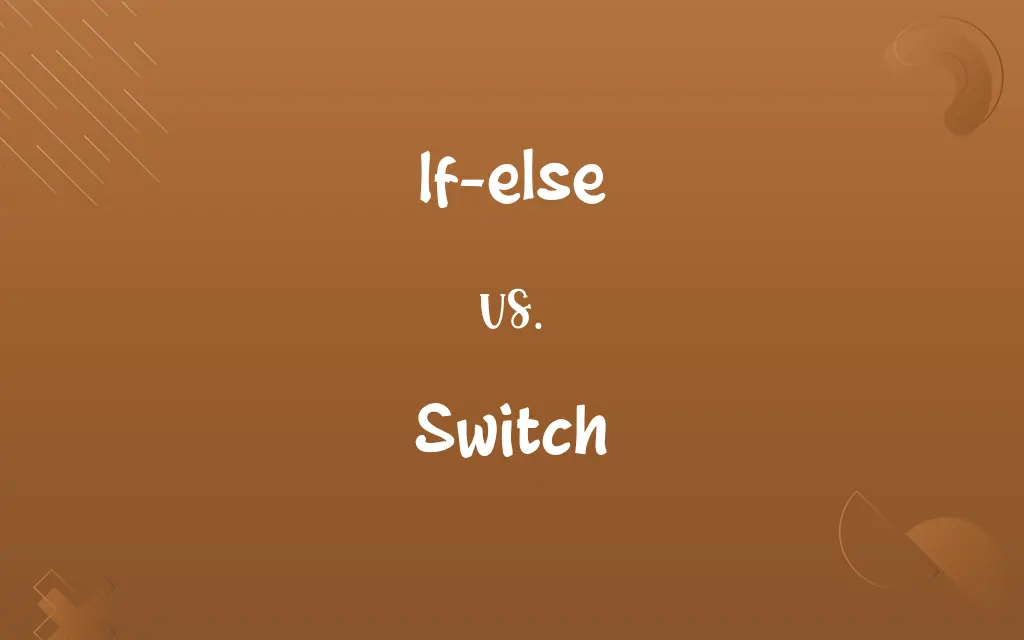If-else vs. Switch: Know the Difference

By Hifza Nasir & Dua Fatima || Published on March 6, 2024
If-else provides conditional logic based on boolean expressions, while switch selects code blocks to execute based on matching a variable's value to predefined cases.

Key Differences
If-else statements evaluate boolean expressions to direct program flow, ideal for conditions with few outcomes or complex logic. Switch statements, by contrast, match a variable's value to predefined cases, executing the corresponding code block, optimized for readability and efficiency with multiple discrete values.
Hifza Nasir
Mar 06, 2024
In programming, if-else allows for greater flexibility with conditions, enabling nested and compound logical expressions. Switch, however, restricts case values to constants or literals, limiting its flexibility but simplifying code structure when dealing with numerous specific values.
Dua Fatima
Mar 06, 2024
Performance-wise, switch can be more efficient than if-else in scenarios with many cases, as some compilers optimize switch into jump tables, reducing execution time. If-else, while versatile, may lead to longer evaluation times with multiple conditions due to sequential checking.
Dua Fatima
Mar 06, 2024
Switch statements enhance code readability and maintenance when dealing with enumeration values or specific range checks, as each case is clearly defined. If-else, though more flexible, can lead to more complex and less readable code with extensive nesting.
Hifza Nasir
Mar 06, 2024
In languages like JavaScript, switch cases fall through by default unless explicitly broken, a behavior that requires careful management to prevent unintended execution. If-else structures, inherently sequential, avoid this issue by executing only the first true condition's block.
Hifza Nasir
Mar 06, 2024
ADVERTISEMENT
Comparison Chart
Flexibility
High, supports complex conditions
Lower, requires constant or literal cases
Hifza Nasir
Mar 06, 2024
Performance
Sequential checking, potentially slower
Can be optimized into jump tables
Dua Fatima
Mar 06, 2024
ADVERTISEMENT
If-else and Switch Definitions
If-else
Conditional statement based on boolean expressions.
If the temperature is below 0, display Freezing; else, display Warm.
Dua Fatima
Feb 26, 2024
Switch
Contains cases with specific values to match.
Switch on number: case 1, print One; case 2, print Two.
Hifza Nasir
Feb 26, 2024
If-else
Ideal for binary or complex conditional operations.
If the user is logged in, show profile; else, show login screen.
Dua Fatima
Feb 26, 2024
Switch
Selects execution block based on variable's value.
Switch on day: case Monday, go to work; case Sunday, relax.
Dua Fatima
Feb 26, 2024
ADVERTISEMENT
If-else
Supports nested conditions for complex logic.
If it's raining, take an umbrella; else if it's sunny, wear sunscreen; else, dress normally.
Hifza Nasir
Feb 26, 2024
Switch
Can default to a case when no match is found.
Switch on user role: case Admin, show dashboard; default, show user page.
Hifza Nasir
Feb 26, 2024
If-else
Executes the first true condition block.
If the score is above 90, grade A; else, grade B.
Hifza Nasir
Feb 26, 2024
Switch
Requires break statements to prevent fall-through.
Switch on color: case Red, display alert; break; default, do nothing.
Dua Fatima
Feb 26, 2024
If-else
Can evaluate multiple conditions using logical operators.
If it's weekend and sunny, go to the beach; else, stay home.
Dua Fatima
Feb 26, 2024
Switch
Optimized for readability with multiple discrete cases.
Switch on command: case Start, initiate process; case Stop, terminate process.
Hifza Nasir
Feb 26, 2024
Repeatedly Asked Queries
Can switch statements handle complex logical conditions like if-else?
No, switch is limited to matching specific values and cannot evaluate complex logical conditions.
Hifza Nasir
Mar 06, 2024
What's the primary difference between if-else and switch statements?
If-else evaluates boolean expressions, while switch matches a variable's value to predefined cases.
Dua Fatima
Mar 06, 2024
How do you prevent fall-through in switch cases?
Use break statements after each case to prevent unintentional fall-through.
Hifza Nasir
Mar 06, 2024
Is switch statement supported in all programming languages?
Most, but not all, programming languages support switch; its syntax and features can vary.
Dua Fatima
Mar 06, 2024
When should you use switch over if-else?
Use switch when dealing with multiple specific values for cleaner, more readable code.
Hifza Nasir
Mar 06, 2024
Is there a performance difference between if-else and switch?
Switch can be more efficient with many cases due to possible compiler optimizations like jump tables.
Dua Fatima
Mar 06, 2024
Can you use variables in switch case labels?
Typically, case labels must be constants or literals; some languages might offer extensions for more dynamic behavior.
Hifza Nasir
Mar 06, 2024
Are there any scenarios where if-else is preferred despite multiple cases?
If-else might be preferred for conditions that are not discrete or when complex logic is involved.
Hifza Nasir
Mar 06, 2024
How does nesting work in if-else and switch statements?
If-else can be nested within each other for complex logic, while switch cases can be nested but are less common and can complicate readability.
Dua Fatima
Mar 06, 2024
Can if-else statements evaluate multiple conditions simultaneously?
Yes, if-else can use logical operators to evaluate compound conditions within a single statement.
Hifza Nasir
Mar 06, 2024
How does code readability compare between if-else and switch?
Switch generally offers better readability with multiple discrete cases, while if-else can become less readable with extensive nesting.
Hifza Nasir
Mar 06, 2024
Can switch be used with types other than integers?
Yes, depending on the language, switch can be used with characters, strings, and other types.
Dua Fatima
Mar 06, 2024
Can switch cases execute multiple statements?
Yes, each case in a switch statement can execute multiple statements until a break is encountered or the block ends.
Dua Fatima
Mar 06, 2024
How do you handle a default case in switch statements?
Use the default keyword to define a block that executes when no other case matches.
Dua Fatima
Mar 06, 2024
How do default cases in if-else and switch differ?
In if-else, the final else acts as a default, executing when no condition is met. In switch, the default case serves a similar purpose, executing when no case matches.
Hifza Nasir
Mar 06, 2024
Share this page
Link for your blog / website
HTML
Link to share via messenger
About Author
Written by
Hifza NasirCo-written by
Dua Fatima





































































